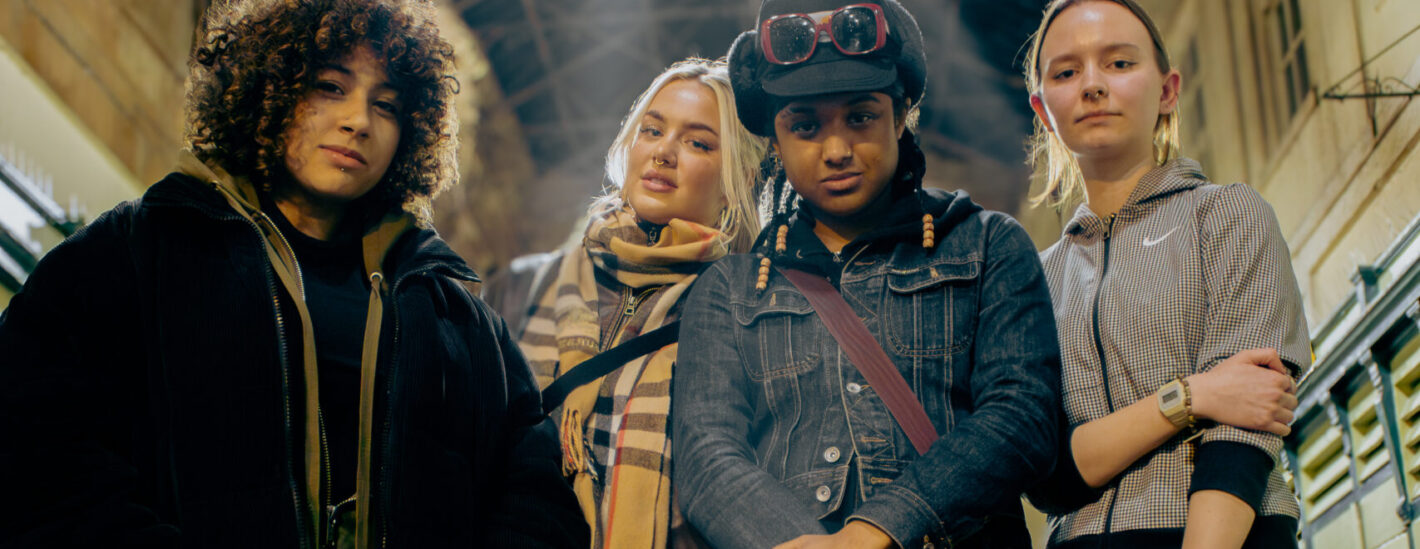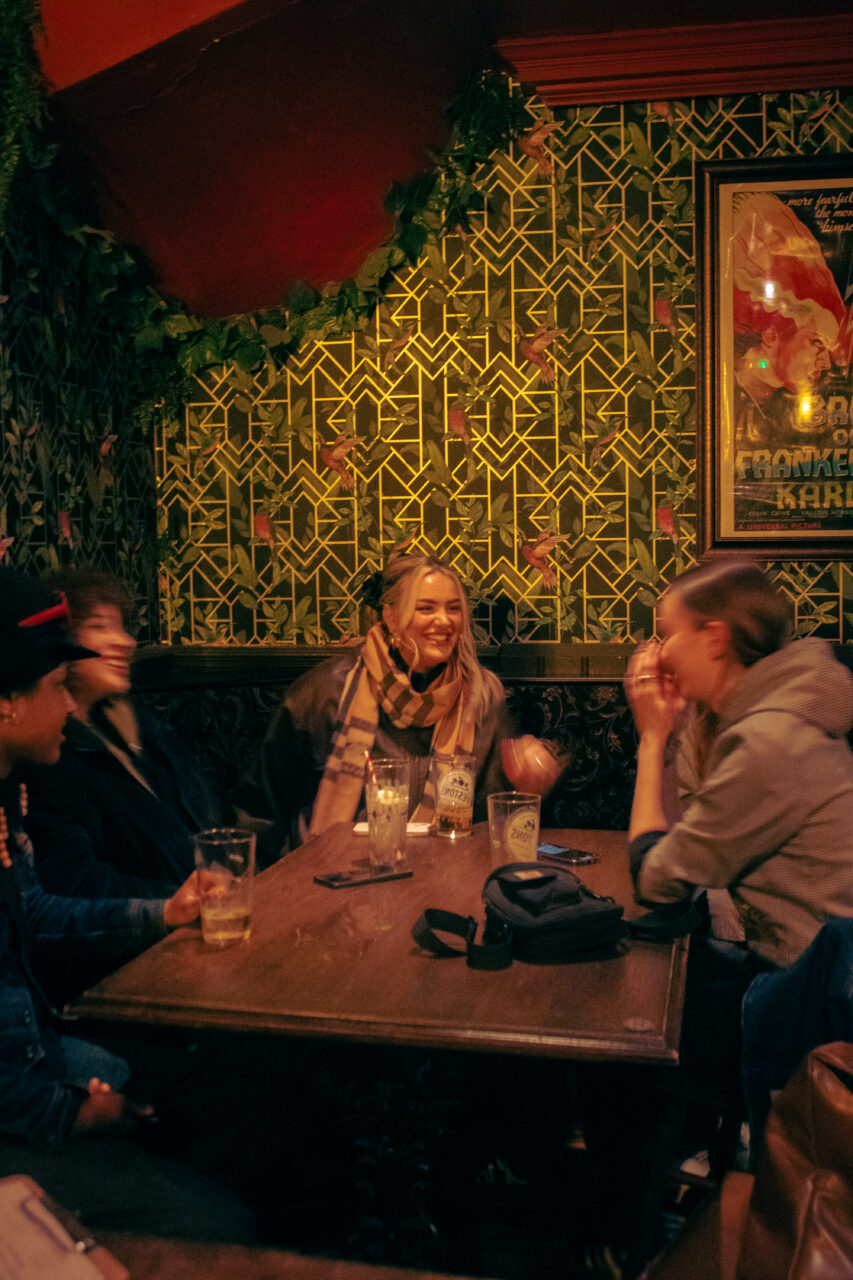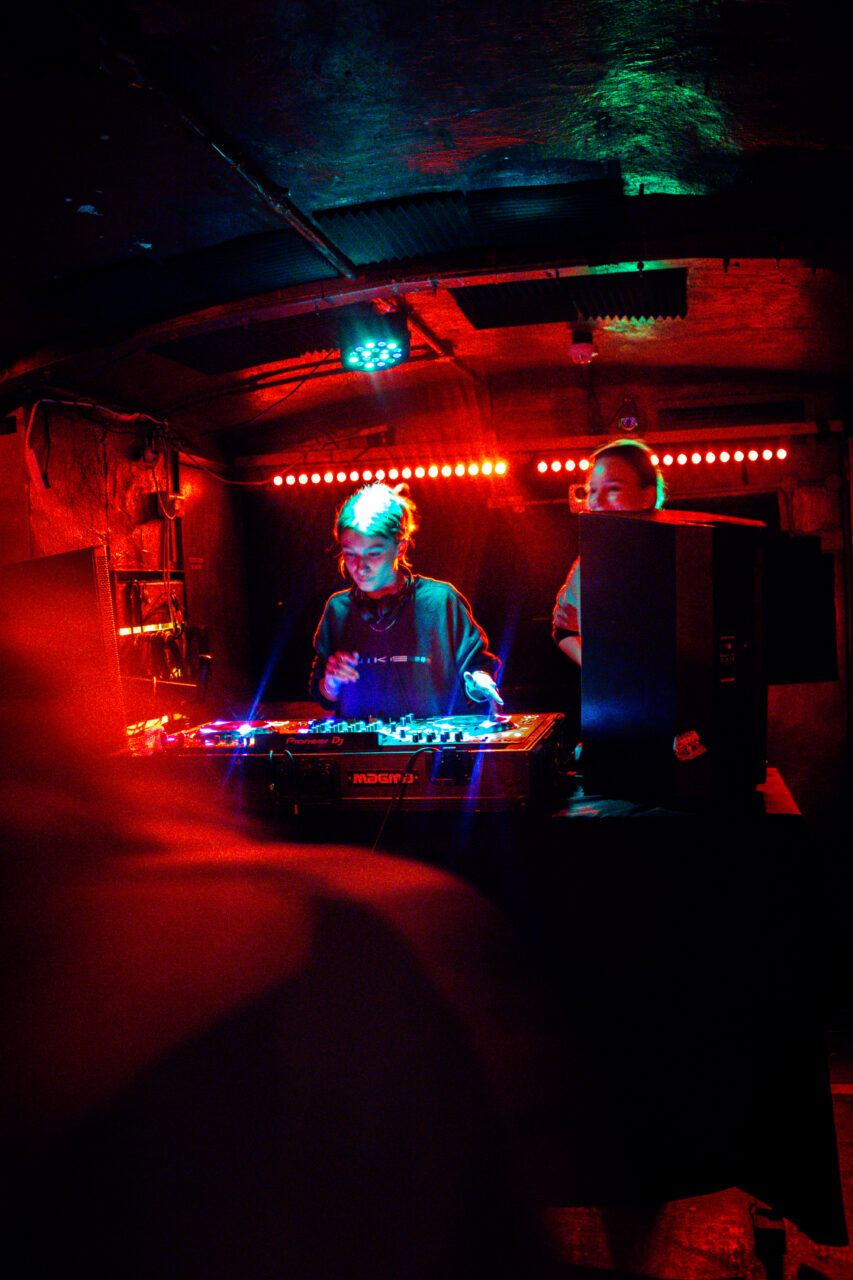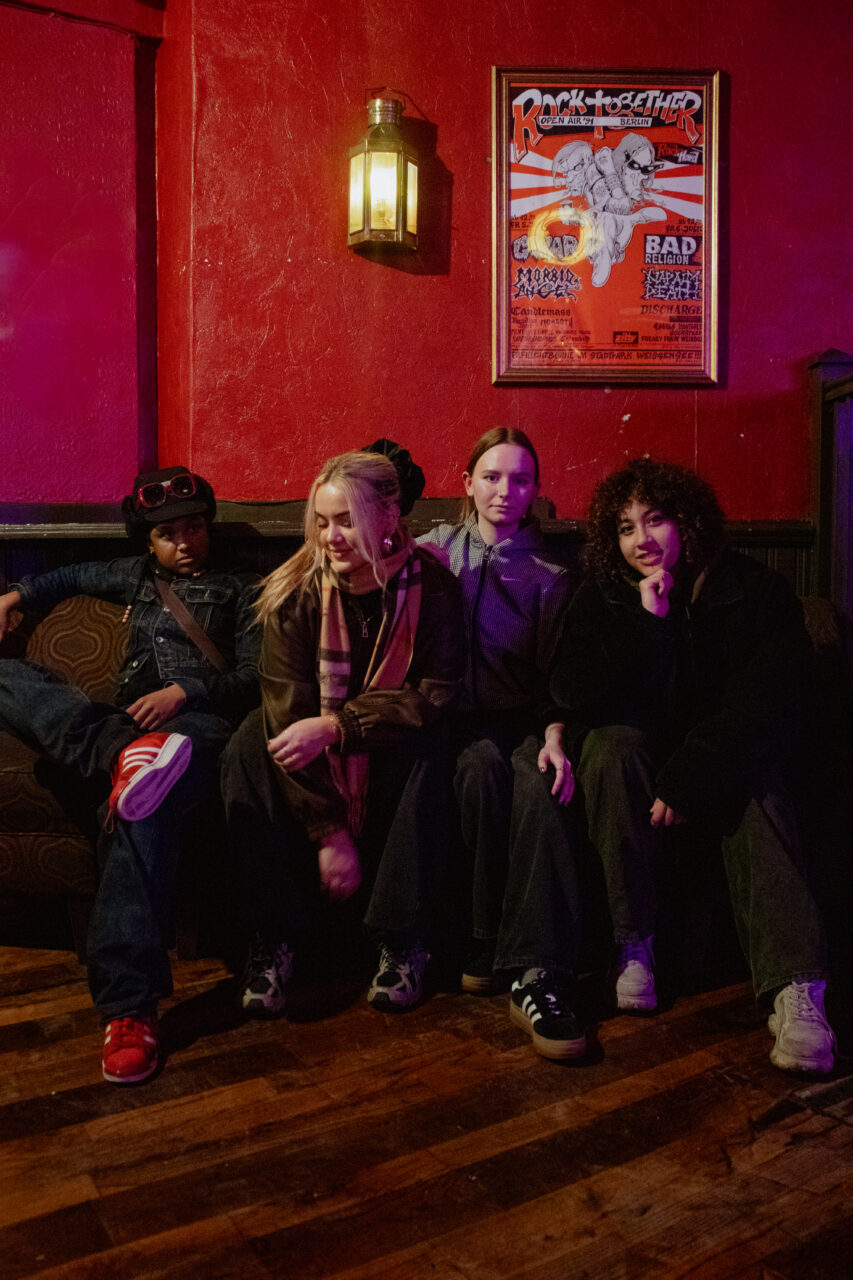Interview: Bad Bitch Dubz
 By Resonate | April 15, 2024
By Resonate | April 15, 2024
Words by Rosie Burgess
Bad Bitch Dubz is a female and non-binary DJ collective on a mission to dismantle the industry’s gender barriers with a sonic revolution that ignited in early 2023. Its seven resident members are focused on “creating a welcoming space for female and non-binary individuals to dive into the world of DJing”. The collective emerged from a shared desire to disrupt the status quo, especially within the music education system. With roots in BIMM’s Electronic Music Production course, the group addresses the gender disparity in a traditionally male-dominated field.
In the lead-up to their open decks event at The Crown, I ventured to the celebrated venue on a rainy Tuesday evening to meet up with four members: Ava, Dashy, Heyza, and Azumei. When I arrived there, the pub was almost vacant but soon packed out in anticipation of the upcoming event, with bass echoing through the walls. With a range of resident DJs, the collective spans a myriad of electronic dance genres from Garage and 140 to Jungle and Ghettotek, with each member bringing their own unique flare to the dancefloor. At this event, however, the decks were open to all DJs of any level, giving upcoming artists a chance to gain exposure and a wider network.

Against a backdrop of dimmed lights, in a booth next to the men’s toilets, we engaged in a dialogue that spanned the spectrum of their influences, the evolution of their sound, and the collaborative synergy that defines their unique collective identity.
Q: Can you tell me a bit about who you are, where you’re from and what you do?
D: We are Bad Bitch Dubz. We are a female and non-binary DJ collective and events label in Bristol. We are a group of seven DJs who all play a mixture of genres, and our focus is on giving a platform to promote upcoming female and non-binary DJs and provide them with a safe space to learn how to DJ if they’ve never tried it before.
Q: What advice would you give to female DJs trying to be successful in the industry?
H: Put yourself out there, put yourself out there, and put yourself out there. Taking every opportunity and pushing your stuff is important. If you have a mix that you’re sitting on that you’re a bit scared about because it might have a few errors, put it out there. Also, use your social media as a marketing tool and don’t feel held back or embarrassed to promote yourself. Promotion isn’t embarrassing. It’s you showcasing your skill and your passion, and our passions are so integral to us. So, go for it.
Q: How did you decide that starting a female and non-binary collective was something that you wanted to do?
D: It was something we knew needed to happen in the industry, especially coming from a music university. A few of us are on the Electronic Music Production course at BIMM, which is heavily male-dominated. We decided that something needed to change and figured that we all had an interest in DJing, so creating a society would benefit the university.
AZ: The cultivation of a space where women and nonbinary people can come together and create something is incredibly important and we wanted to be able to contribute to that.
Q: What does this collective mean to you, and why do you think it is important to create these spaces?
D: When we started this collective, I knew it was important to create a space that I would’ve wanted when I started to DJ. I wanted to create a safe space for people to come and ask questions, experiment with different genres, and not have to fit into a certain box. The industry must build a community that brings female and non-binary DJs together to explore their creativity.
Q: How do you balance your music career with running a collective – how do you separate these two music identities?
AZ: It’s balancing the sets you do as an individual artist and the sets you do as a collective. It’s almost like you have these two simultaneous avenues that you want to see do equally well. Aside from DJing, many of us sing, produce, and play guitar, and I think that those extra pursuits within music help enrich yourself as an artist.
D: We also encourage all our residents to play sets under their aliases to ensure they are making a career for themselves as DJs outside the collective.

Q: Is there a standout moment that you decided that DJing is something you wanted to pursue full-time?
H: I knew I wanted to DJ when I knew music was integral to identity. Growing up, the grime scene heavily influenced my dad, and he used to DJ and MC. There’s a photo of me in an Aston Villa shirt pretending to DJ on the decks in our garage, and that was the moment that I knew how connected music was to my identity as a West Midland girl. I saw the energy my dad brought to a room and how music brought people together, and I thought, ‘This is something I want to be a part of.’
AZ: It’s that connection to others when you’re playing your music, yourself, and your history. I remember when I was a kid, and the first thing my dad would ask me in the morning was hip-hop or reggae. I would always choose hip-hop at first because I liked how the words sounded, and then I listened to reggae and dub when I was a bit older. It’s those kinds of things. Growing up as an ethnic minority in the West Midlands, it can be pretty tough to find that identity in a harsh environment, but music is a real conduit for finding yourself within a pretty hostile world.
Q: How do you define success for yourself?
H: I would define success as feeling fulfilled by music. Success is playing music, connecting with other people and inspiring the next generation. We want to deplete the idea that music is a little boys’ club, and I feel like what we’re doing symbolises something way bigger than music. Music is ideology, image, and politics. We bring everything which should be at the forefront of our actions.
Q: What have you learnt from starting a collective?
AZ: How much more I need to learn because of my mistakes. Also, take time, breathe, and just have fun. I’ve done so many sets where I’ve been so nervous and focused on what I’m doing that I forget to have fun.
D: We’re learning how important it is that we’re doing what we’re doing. The more opportunities we get, the more I realise how important it is to keep pushing and creating the space.
Q: How accessible do you think the electronic industry is for female musicians?
AV: It’s just not really at all. That’s why it’s so important that we’re doing what we’re doing because we collectively feel we don’t have the same opportunities as our male counterparts. Creating something that means girls don’t feel so isolated is vital. From personal experience, I’m the only girl in my class, and it always feels like a club you’re not included in. So, to have this group that I’m in where everyone is in the same boat and all are accepting of each other is important.
Q: What barriers have you had to overcome so far in your career as a female DJ?
D: We’ve had incidents with male promotors talking badly about us, not respecting us for our talent and talking bringing it down to how we look. I don’t understand why it’s even discussed, but unfortunately, it is, which makes it even more important that we’re doing what we’re doing.
Q: What’s been your biggest achievement in your career so far?
D: Our biggest achievement is getting Gaia from Girls Don’t Sync to come and headline our final residency event at the crown on March 16th. Having an idol of ours who stands for what we stand for to represent under our name is one of the biggest achievements so far.

As the conversation drew to a close, the members couldn’t contain their enthusiasm as they discussed the eagerly anticipated headline event. The shared sentiment of excitement was clear as they gushed over having acknowledgement and support from an idol who resonates with their values. No doubt, this milestone marks a pivotal moment in the collective’s journey and could lead to growth and recognition for each member.
Bad Bitch Dubz and their unapologetic quest for inclusivity transcends the conventional values of a DJ collective. They embody a dynamic movement that challenges norms and reshapes the narrative of who belongs in the electronic music scene. Their story serves as a testament to the countless young female and non-binary musicians who have lacked support and opportunities, while their passions demonstrate the power that music has in forming identity and creating inclusive spaces for all groups. As they continue to navigate the music industry, Bad Bitch Dubz is certain to make an impact on Bristol’s electronic music scene and leave behind a foundation for future trailblazers.
You can catch Bad Bitch Dubz at Tell Me Where it Hertz on March 22nd at Stokes Croft venue The Bell.